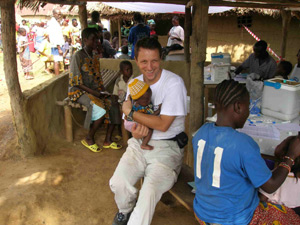
Robin Sands is an Australian logistician, responsible for food supply of Médecins Sans Frontières (MSF) nutritional programs in Maradi, southern Niger in 2006. This is Robin’s second mission with MSF and in the following interview he describes the technical aspects of delivering food and some of the personal challenges and rewards of being involved in such an operation.
Could you walk us through the food supply system, how do you get it and how do you distribute it?
So we have the 11 ambulatory nutritional sites which provide a remote service for food where people come in once a week. Under the old system people stayed for a certain time under total care of MSF. But under the new system, those that have no medical problems [aside from being malnourished] come in regularly, collect their food for their malnourished children and can then go and live in their homes and happily feed their children. Most people prefer it that way.
So I supply food to 11 different sites which are spread around the two different counties of Madarounfa and Guidan Roumdji, a travelling distance of no more than 45 to 60 minutes from Maradi. In each site we have a store where we do a continuous supply of food to people who come in.
What is actually in the food and protection rations?
The main form of food distribution is for the children who are malnourished and for that we have ready-to-use food (RUF), which is a hybrid peanut paste vitamin supplement. That is supplied with two sachets a day per child, so each week and for each child the mother gets 14 sachets of RUF.
When the sickest children first arrive they receive blankets; a mat and a mosquito net to help maintain their health while they are staying in the hospital. This also aids them because they can stay in the hospital for about four weeks – they follow through the program and if the child is well and there are no complications and they can leave the program, we provide them with what we call a discharge ration which is 15 kilograms of ‘mil’ [millet], which is the local grain, 25 kilograms of Unimix, which is a standard vitamin supplement grain and then we supply them with their last ration of RUF, another 14 sachets, some soap and 5 liters of oil.
How do you source the food?
The millet is a local grain so we source that locally here and for the others we source through MSF logistics and we can also source it in collaboration with groups such as the World Food Program and UNICEF - we can get supplies from them locally because they already have it here, and to save shipping it all in we can have an agreement with them and they can also help us with the supply because its such a large amount of food – it’s a lot to ship in and if we can use other sources to get food to help the population then that’s also great.